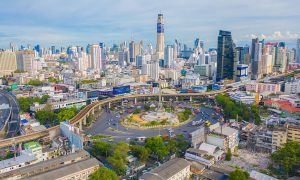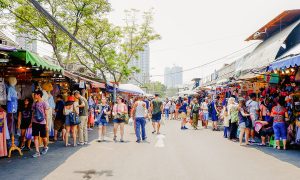With Thailand becoming a globally popularimmigrantsdestination, more and more people are choosing to move to this tropical country. However, due to the lack of understanding of immigration policies and local culture, manyrecent immigrantsIt is easy to fall into some common misconceptions during the preparation process. These misconceptions can lead to application delays, additional financial burdens, and even affect the quality of life after immigration. This post will take stock ofImmigration to Thailandcommon misconceptions and offers practical advice to help you avoid these mistakes and make your immigration journey smoother.
Misconception 1: Thinking that "Visa on arrival" or "Tourist visa" allows you to stay for a long period of time
Many people think that if they have a visa-on-arrival or tourist visa for Thailand, they can live there for a long period of time, but this is actually a misconception.
reality::
Visas on arrival and tourist visas only allow short stays, usually between 15 and 60 days, depending on the type of visa and country policy. If the permitted stay is exceeded, it is considered illegal residence and may face fines or deportation.
method settle an issue::
Those who plan to stay for a long period of time should choose the appropriate type of long-term visa, such as a Retirement Visa (Non-Immigrant O-A Visa), a Work Visa (Non-Immigrant B Visa) or an Elite Visa (Thailand Elite Visa).
Myth 2: Underestimating the complexity of visa applications
Many people assume that visa applications are a simple process before emigrating, but Thailand's visa policy is complex and full of details.
reality::
Different types of visas have different requirements, such as proof of finances, health insurance, and proof of a clean criminal record. If you are not well prepared, you are likely to fail your application due to lack of necessary documents.
method settle an issue::
Know the specific requirements of your target visa type in advance and make sure all documents are complete. If unsure, seek the help of a professional immigration agent or lawyer to ensure that the application goes through.
Myth #3: Ignoring Language and Cultural Differences
Many immigrants believe that Thailand is an internationalized country and that language and culture will not pose a problem, but in reality, language and cultural barriers can cause many inconveniences.
reality::
Although English is more commonly used in tourist areas, in everyday life, especially in more remote areas, most Thais speak only Thai. In addition, Thailand has its own unique culture and social etiquette, such as high respect for the King and religion. Failure to understand these cultural differences may lead to misunderstandings or unnecessary trouble.
method settle an issue::
- Learn basic Thai vocabulary and everyday phrases;
- Respect local cultural practices, such as dressing appropriately in temples and removing shoes when entering houses;
- Be active in the community and learn about the Thai way of life.
Myth #4: Underestimating the Cost of Living
many peopleImmigration to ThailandIt's because of its relatively low cost of living, but underestimating some of the hidden costs can lead to budget overruns.
reality::
While the basic cost of living in Thailand is low, in some areas (e.g., international schools, imported goods, private healthcare, etc.), costs may be higher than expected. Especially in popular cities like Bangkok and Chiang Mai, the cost of living may be higher than in rural areas.
method settle an issue::
- Create a detailed budget prior to emigration that covers the costs of housing, transportation, medical care, insurance, etc;
- (b) Choosing the right living area according to actual needs. For example, choosing a city that is not a tourist area can reduce the cost of living;
- Explore local markets and reduce dependence on imported goods.
Myth #5: Ignoring the Importance of Medical and Health Insurance
Some immigrants feel that medical care in Thailand is cheap and therefore do not purchase health insurance. However, this decision can cause great financial stress in the event of an accident.
reality::
Although Thailand's healthcare system is of high quality and affordable, the cost of a major illness or emergency surgery should not be underestimated. In addition, many long-term visas require the holder to have health insurance.
method settle an issue::

- Purchase health insurance with comprehensive coverage to ensure that hospitalization, outpatient and emergency care are covered;
- Research the difference between public and private hospitals in Thailand and choose the right medical care for your needs.
Myth #6: Ignoring Tax and Legal Liability
Many immigrants underestimate the tax obligations and legal risks that come with immigration, such as whether they are required to file tax returns for work in Thailand or whether they will still be subject to the tax liabilities of their country of origin after immigration.
reality::
Thai residents are subject to income tax based on income. In addition, the treatment of international income may be relevant to the tax policies of the country of origin. If you are not aware of the relevant laws, you may face financial penalties.
method settle an issue::
- Consult a professional tax advisor to learn about Thailand's tax policies and tax agreements with your country of origin;
- Complete necessary tax returns on time to avoid facing legal issues for unpaid taxes.
Myth 7: Not planning ahead for retirement or long-term settlement options
Some people assume that they can readily find the right housing, friends, or neighborhood after immigrating, but failing to plan ahead can make a big difference in the quality of life.

reality::
Retirement living and long-term settlement require consideration of many aspects such as housing, social circles, and daily activities. Without advance planning, one may feel isolated or uncomfortable.
method settle an issue::
- Make a pre-rental site visit to ensure the safety and convenience of the neighborhood;
- Join a local diaspora or interest group to expand your social circle;
- Set goals for retirement, such as learning new skills or getting involved in volunteer activities.
Myth 8: Thinking you can easily get permanent residency or citizenship after immigration
Many people thinkImmigration to ThailandPermanent residency or even citizenship can be obtained very quickly afterward, but the actual operation is far more complicated than imagined.
reality::
The application requirements for permanent residency and nationality in Thailand are very strict and only those who meet certain residency, language proficiency and financial requirements are eligible to apply. In addition, the nationality application process can take years.
method settle an issue::
- Learn about the latest policies on permanent residence and naturalization in Thailand;
- Be prepared for alternatives to long-term residence, such as regular visa renewals.
concluding remarks
Immigration to Thailandis an exciting decision, but it is vital to avoid common misconceptions. By fully understanding key elements such as visa policies, cultural differences, cost of living and legal responsibilities, you can better plan the immigration process and ensure a smooth and comfortable life afterward. If you are unsure about certain aspects, be sure to consult professional advice and prepare every step of the way to build a solid foundation for your new life in Thailand!






